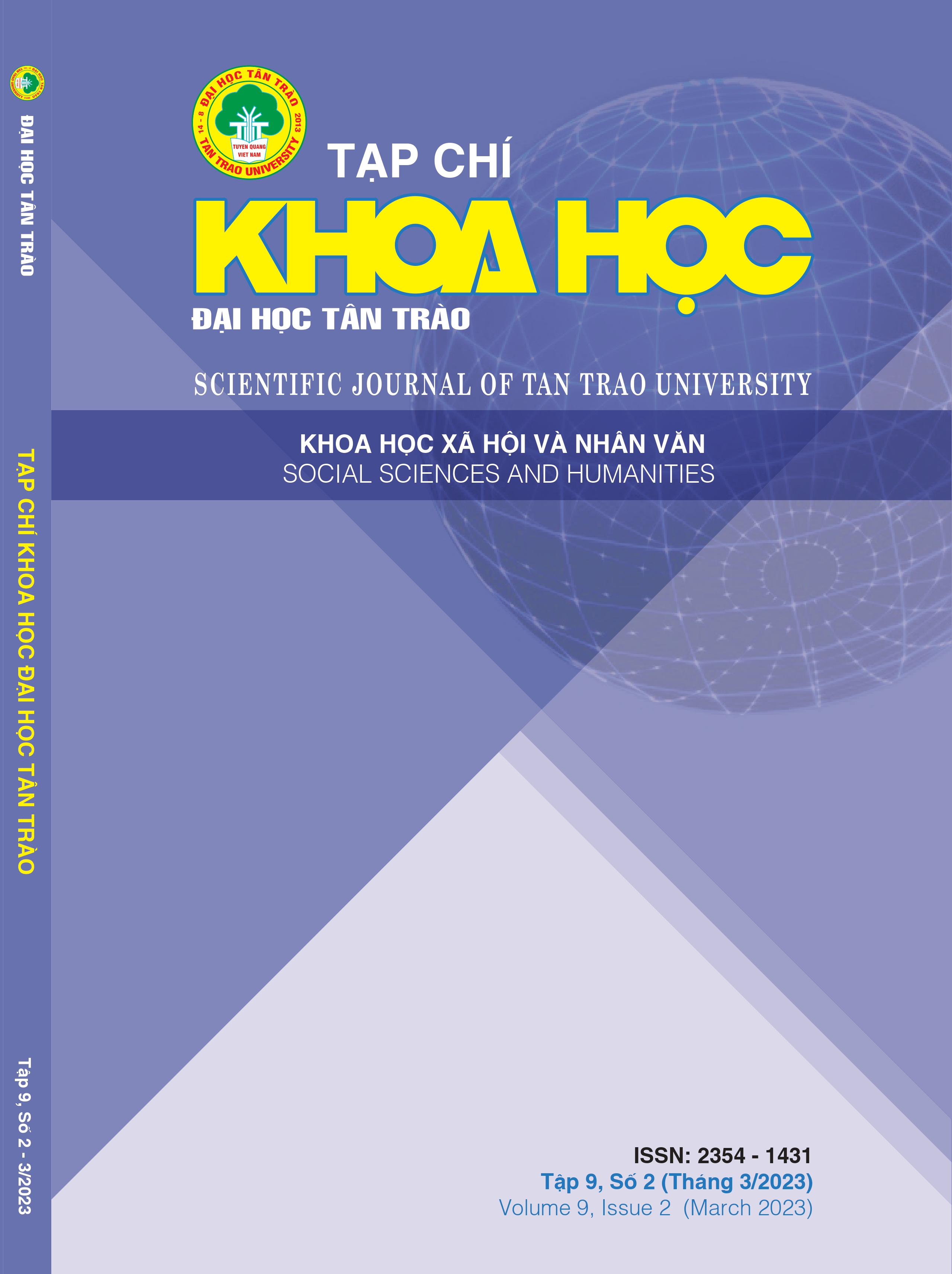ECONOMIC EFFICCIENCY ANALYSIS OF ORGANIC FARMING MODELS IN TUYEN QUANG PROVINCE
DOI:
https://doi.org/10.51453/2354-1431/2023/932Keywords:
Hiệu quả kinh tế, Cam hữu cơ, sản xuất hữu cơ, Tuyên Quang.Abstract
Nghiên cứu này thực hiện nhằm phân tích hiệu quả kinh tế mô hình trồng cam hữu cơ trên địa bàn tỉnh Tuyên Quang. Nghiên cứu sử dụng phương pháp thống kê mô tả, thống kê so sánh và tiến hành điều tra phỏng vấn 60 hộ gia đình trồng cam (trong đó có 30 hộ trồng cam theo phương pháp sản xuất thông thường, 30 hộ trồng cam theo phương pháp hữu cơ). Kết quả nghiên cứu cho thấy, trồng cam theo phương pháp hữu cơ mang lại hiệu quả kinh tế cao hơn so với trồng cam theo phương pháp thông thường. Thu nhập của hộ gia đình trồng cam theo phương pháp hữu cơ là 101.724,24 (triệu đồng/ha/năm) trong khi hộ gia đình trồng cam theo phương pháp thông thường chỉ thu về 63.623,76 (triệu đồng/ha/năm). Có thể thấy phương pháp trồng cam hữu cơ thu về lợi nhuận gấp 1,6 lần so với trồng cam theo phương pháp thông thường.
Downloads
References
[1] Department of Agriculture and Rural Development of Tuyen Quang province, 2021, Report on results of agricultural, forestry-fishery production and rural development in 2021; Orientations and Tasks in 2022. Report No 512/BC-SNN on 17/12/2021.
[2] Dao Thanh & Van Thuong (2022). Organic farming in the process of maintaining momentum. Available online: https://nongsanviet.nongnghiep.vn/nong-nghiep-huu-co-van-dang-giai-doan-chay-da-d325284.html. Access on 13/6/2022.
[3] FAO. (2022). What are the environmental benefits of organic agriculture? Available online: https://www.fao.org/organicag/oa-faq/oa-faq6/en/ access on 12/12/2022.
[4] Karipidis, P., & Karypidou, S. (2021). Factors that Impact Farmers’ Organic Conversion Decisions. Sustainability, 2-24.
[5] Lockeretz, W. (2007). Organic Farming: An International History. CABI Digital Library.
[6] M.Hubera, E. ́. (2011). Organicfoodandimpactonhumanhealth:Assessingthestatusquoandprospectsofresearch. NJAS-WageningenJournalofLifeSciences, 103-109.
[7] Nghia, N. Đ., Minh, N. T., & Thao, P. P. (2016). Technology trend analysis report: Trends and development of organic agriculture and cleaning agricultural products production in Vietnam. Ho Chi Minh City: Center for Science & Technology Information and Statistics.
[8] Phat, C. T. (2022). Organic farming: Current situation and development directions in Vietnam. Available online: http://tapchimattran.vn/kinh-te/nong-nghiep-huu-co-thuc-trang-va-mot-so-huong-phat-trien-tai-viet-nam-43780.html . Access on 21/2/2022.
[9] Reganold, J. P., & Wachter, J. M. (2016). Organic agriculture in the twenty-first century. Nature Plants, 2 (2), 1-8.
[10] Viet, B. N. (2022). Organic farming is still in momentum process. Available online: https://nongsanviet.nongnghiep.vn/nong-nghiep-huu-co-van-dang-giai-doan-chay-da-d325284.html access on 13/6/2022
Downloads
Published
How to Cite
Issue
Section
License

This work is licensed under a Creative Commons Attribution-ShareAlike 4.0 International License.
All articles published in SJTTU are licensed under a Creative Commons Attribution-ShareAlike 4.0 International (CC BY-SA) license. This means anyone is free to copy, transform, or redistribute articles for any lawful purpose in any medium, provided they give appropriate attribution to the original author(s) and SJTTU, link to the license, indicate if changes were made, and redistribute any derivative work under the same license.
Copyright on articles is retained by the respective author(s), without restrictions. A non-exclusive license is granted to SJTTU to publish the article and identify itself as its original publisher, along with the commercial right to include the article in a hardcopy issue for sale to libraries and individuals.
Although the conditions of the CC BY-SA license don't apply to authors (as the copyright holder of your article, you have no restrictions on your rights), by submitting to SJTTU, authors recognize the rights of readers, and must grant any third party the right to use their article to the extent provided by the license.


